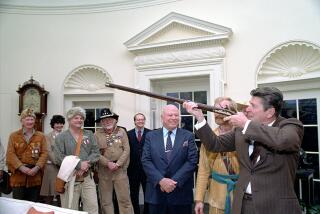Reagan to Order Sweeping Study of Welfare Programs
- Share via
WASHINGTON — President Reagan will order a sweeping study of the nation’s welfare system in his State of the Union address next week, a step that in his first term would have been politically unthinkable, White House officials said.
The study, which will take nearly a year to complete, will examine all federal programs that deliver aid to the poor, from food stamps to Medicaid, a conglomerate of assistance that totals $70 billion a year.
Administration officials said that they believe the intellectual and political climate has changed with regard to welfare and that the nation is ready for a dramatically different approach. Even liberal politicians, they said, acknowledge that costly federal programs have not solved the problem of poverty.
O’Neill Said to Favor Study
An aide to House Speaker Thomas P. (Tip) O’Neill Jr. (D-Mass.), who clashed with Reagan as recently as Tuesday over his attitudes toward the poor and unemployed, said the Speaker welcomes the study--although he is suspicious of Reagan’s motives.
“How could he (O’Neill) be against learning more?” said the aide, Christopher Matthews. “Everybody knows it’s not a good system and has created dependency.”
Reagan often cites as one of his proudest achievements as California governor his reform of the state’s welfare system, which shaved welfare rolls by tightening eligibility standards but increased payments overall.
A top White House official said the proposed study is “not an effort to just repeat the California experience. . . . A lot of time has passed since then.”
Stems From 1983 Briefing
The impetus for this top-to-bottom look at welfare can be traced to a November, 1983, briefing Reagan received on the impact of government on families. While that briefing focused on the negative effect of the tax code on families, it also implicated the welfare system as a divisive force that tended to discourage black men in particular from assuming family responsibility.
At the time, top White House officials were enmeshed in tax revision, a program they considered far more salable for the President on the eve of a reelection campaign than an inevitably unpopular look at government services to the poor.
But welfare reform never was far from Reagan’s mind, and he pressed top aides to include it in this year’s speech, which he will deliver before a joint session of Congress Tuesday evening.
A White House official said the welfare initiative “supports one of the key pillars of the speech,” which is Reagan’s emphasis on the family and basic American values.
Critics Are Suspicious
However, critics said the proposal seems bound to prompt suspicion that what Reagan really wants is to slash welfare rolls and reduce government’s role in caring for the less fortunate.
Reagan often tells anecdotes that suggest the poor are taking advantage of government programs, and during his 1980 election campaign he was widely quoted as telling a story about a welfare recipient who bought a bottle of vodka with change from food stamps.
On Tuesday, O’Neill angrily accused Reagan of spreading “a bunch of baloney” after the President said that a large number of the unemployed do not want to work.
But White House officials believe Reagan’s popularity rating, which reached an astounding 74% in a recent GOP public-opinion poll, will shield him against such criticism.
Looking for Lasting Effects
“The vast majority of Americans see him as anything but mean,” said one official. “We need to look at things in a fresh light, rather than being locked into preconceptions that no longer exist.”
White House officials deny that Reagan’s primary goal is to save money, despite the enormous budgetary pressures created by the passage of the Gramm-Rudman balanced-budget law. “This is not a major budget exercise but a policy exercise on how to better deliver goods and services and do it in ways that have lasting effect, not just for 30 days,” said a top aide.
But an outside political adviser said that budgetary factors obviously will play a role and that the existence of Gramm-Rudman has made it possible for Reagan to raise a previously untouchable issue.
More Latitude to Act
“In a year of budget constraints, he has a lot more ability to discuss something like this,” this adviser said.
Moreover, he said, Reagan’s philosophical approach to government is bound to be reflected in any proposals that eventually emerge.
“He’s always wanted to engineer proposals to lessen people’s reliance on government,” he said. “Now the environment is a lot more conducive to that.”
More to Read
Get the L.A. Times Politics newsletter
Deeply reported insights into legislation, politics and policy from Sacramento, Washington and beyond. In your inbox twice per week.
You may occasionally receive promotional content from the Los Angeles Times.








